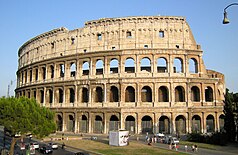
Classical antiquity
Age of the ancient Greeks and Romans / From Wikipedia, the free encyclopedia
Dear Wikiwand AI, let's keep it short by simply answering these key questions:
Can you list the top facts and stats about Classical antiquity?
Summarize this article for a 10 years old
Classical antiquity, also known as the classical era, classical period, classical age, or simply classical history or antiquity,[1] is the period of cultural history between the 8th century BC and the 5th century AD centered on the Mediterranean Sea,[note 1] comprising the interlocking civilizations of ancient Greece and ancient Rome known as the Greco-Roman world. It is the period in which both Greek and Roman societies flourished and wielded huge influence throughout much of Europe, North Africa, and West Asia.[2][3]
| Part of a series on |
| Classicism |
|---|
| Classical antiquity |
| Age of Enlightenment |
| 20th-century neoclassicism |
| Part of a series on |
| Human history Human Era |
|---|
| ↑ Prehistory (Pleistocene epoch) |
| ↓ Future |
Conventionally, it is taken to begin with the earliest-recorded Epic Greek poetry of Homer (8th–7th-century BC), and continues through the emergence of Christianity (1st–4th century AD) and ends with the fall of the Western Roman Empire (5th-century AD). It is followed by a transition period called late antiquity (250–750), a period overlapping with the Early Middle Ages (450–1000). Such a wide span of history and territory covers many disparate cultures and periods. Classical antiquity may also refer to an idealized vision among later people of what was, in Edgar Allan Poe's words, "the glory that was Greece, and the grandeur that was Rome".[4]
The culture of the ancient Greeks, together with some influences from the ancient Near East, was the basis of European art,[5] philosophy, society, and education, until the Roman imperial period. The Romans preserved, imitated, and spread this culture over Europe, until they were able to compete with it, and the classical world began to speak Latin along with Greek.[6][7] This Greco-Roman cultural foundation has been immensely influential on the language, politics, law, educational systems, philosophy, science, warfare, poetry, historiography, ethics, rhetoric, art and architecture of the modern world.[8]
Surviving fragments of classical culture led to a revival beginning in the 14th century which later came to be known as the Renaissance, and various neo-classical revivals occurred in the 18th and 19th centuries.[9][10]

